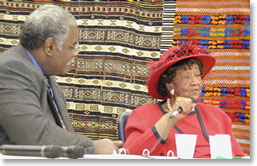ASKIAM

Dr. Dorothy I. Height is a leg-end in her own time. On the eve of her 92nd birthday in late March, she is still active socially and professionally. She is President Emeritus of the National Council of Negro Women (NCNW) and the author of a new book: “Open Wide The Freedom Gates: A Memoir.”
Her mentor, Mary McLeod Bethune, introduced Dr. Height to First Lady Eleanor and President Franklin Roosevelt. Dr. Height has known every U.S. President since then. She was a staunch supporter and organizer of both the 1963 “March on Washington for Jobs and Justice” and the Million Man March in 1995.
A heroine of the Civil Rights Movement in her own right, her book tells the remarkable story of her life, her work, and it sheds some insight into what it means to be both Black and a woman in a White-male dominated society-at-large and a Black-male dominated civil rights movement.
She was born in Richmond, Va. and reared in a small town full of mostly European immigrants, near Pittsburgh. There she excelled academically, but she still felt the pain of racism as a young girl.
“My mother was a trained nurse. She worked at the colored hospital in Richmond,” Dr. Height told an audience at the Martin Luther King Library March 3. But when her family moved to Pennsylvania, “There was not a single hospital nor a nurse’s registry which would take my mother. So, from my earliest childhood I lived with her feelings about not being able to use her professional skills. In fact, she eventually had to take housework.”
But her mother did teach her one very, very important lesson: to know who she was. “That’s one thing that has been characteristic of my life. I’ve learned if you get bitter, you weaken your own capacity to deal with a situation. You make yourself a victim, when in reality you should take charge of your own life.”
Dr. Height marched at civil rights rallies, sat through tense White House meetings, and witnessed every major victory in the Civil Rights Movement. Yet, as the sole woman among the group of influential men who led the civil rights movement, her personal ambition was always secondary to her passion for her cause.
In 1995, Dr. Height successfully led the NCNW campaign which purchased the legendary Sears Building on Pennsylvania Avenue, midway between the U.S. Capitol and the White House. Their is the only Black-owned building on that street between the executive mansion and the legislature, and First Lady Hilary Rodham Clinton spoke at the building dedication. Nation of Islam First Lady, Mother Khadijah Farrakhan, was among the honored guests.
On Oct. 16, 1995, Dr. Height was a speaker at the historic Million Man March. Other women–including prominent Black women–criticized the march’s emphasis on reaching and redeeming Black men. Still other prominent acquaintances of Dr. Height advised her to leave the march alone.
But, she said, she resisted that advice. “I believed in it. I believed in it and I thought that the Minister had called it at a good time, and that if the men were going to be there, I was going to be there. And when I got there I told them: ‘I’m here because you’re here,'” she continued.
“I believed in the Million Man March, though some of my best friends urged me to stay away from it. They said, ‘you don’t want to be tainted,’ or whatever it was. I said: “I am supporting it. I will be there.” And I was there.
Some even “implied” that she distance herself from the Honorable Minister Louis Farrakhan, convener of the Million Man March and leader of the Nation of Islam, she said, “But they don’t tell me what I will do.”
Her nearly 70 years of continuous service has become a bridge over the entire Civil Rights movement. In the book and in her talks, she offers her personal reflections on the serious issues at hand, as well as humor. “Sometimes you’re in situations where you have to laugh just to keep your sanity. These great men had a way of doing that,” she said in her library book talk.
One unlikely humorous discussion was when students and others were making more militant demands than those from the civil rights leadership. Many of the civil rights “veterans were afraid (the militants) would turn over all the tables,” Dr. Height recalled.
They complained: “they’ll upset all the good work the NAACP has done.” Dr. King laughingly said, “Nobody liked it when the NAACP was going into courts. Now that I have people out in the streets marching, at least the NAACP now looks respectable.
“Whitney Young would probably say: ‘You fellows, keep on kicking over tables. When you fellows kick over tables in the restaurants, I can get them to the negotiating table.’ What started off, early on in 1962, as rivalries became kind of jokes. We laughed at each other.”
In her memoir, Dr. Height reflects on a life of service and leadership. She writes about her childhood encounters with racism as well as the excitement of New York college life during the Harlem Renaissance. She writes about participating in protests against lynchings. She writes about her experience on stage as Dr. Martin Luther King Jr. delivered his “I Have a Dream” speech.
She also writes about people she knew intimately throughout the decades: Dr. W.E.B. DuBois, the Hon. Marcus Garvey, Eleanor Roosevelt, Mary McLeod Bethune, Adam Clayton Powell Jr., Langston Hughes, and many others.












